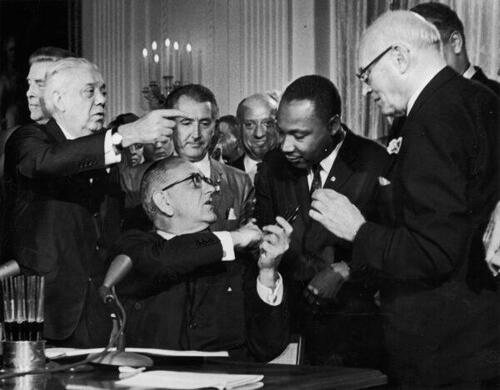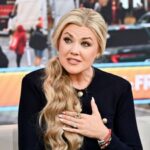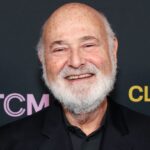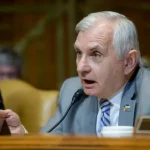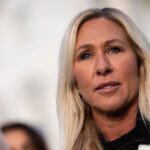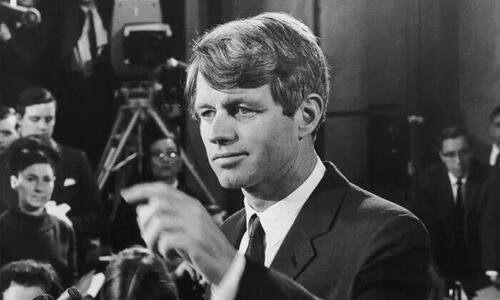
Authored by Jeff Louderbeck via The Epoch Times,
While in Atlanta for a voter rally on the eve of Martin Luther King Jr. Day, Robert F. Kennedy Jr. talked about his family’s relationship with the civil rights leader and said that “there was good reason” for his father, Robert F. Kennedy, to authorize FBI Director J. Edgar Hoover’s to wiretap Dr. King when John F. Kennedy was president.
Before delivering a speech at the event, where he collected signatures to get on the Georgia presidential general election ballot, Mr. Kennedy told Politico that his father, who was attorney general, granted permission for Mr. Hoover to electronically monitor Dr. King’s conversations “because J. Edgar Hoover was out to destroy Martin Luther King and the civil rights movement and Hoover said to them that Martin Luther King’s chief was a communist.”
“My father gave permission to Hoover to wiretap them so he could prove that his suspicions about King were either right or wrong. I think, politically, they had to do it,” Mr. Kennedy said.
Mr. Kennedy noted that his father and his uncle knew that Mr. Hoover was “a racist” and “left no doubt where he stood on those issues” regarding civil rights organizations.
If President Kennedy had been elected to a second term, he would have fired Mr. Hoover, the 2024 independent presidential candidate said, adding that be believes his uncle alerted Dr. King of Mr. Hoover’s wiretaps in a private conversation.
President Kennedy was assassinated in Dallas on Nov. 22, 1963.
Dr. King, who was born and raised in Atlanta, was shot and killed by James Earl Ray in Memphis, Tenn. on April 4, 1968.
After speaking at a campaign event in Los Angeles during his bid to secure the Democrat Party’s presidential nomination, Robert F. Kennedy was shot on June 5, 1968. He died the next day.
On Martin Luther King Jr. Day, Mr. Kennedy posted a video on X, formerly Twitter, sharing stories about the relationship between his father and Dr. King.
In 1967, Dr. King delivered a speech “in which he came out against the Vietnam War,” Mr. Kennedy said in the video.
It was an unpopular stance among other civil rights leaders who thought Dr. King should focus solely on the civil rights movement, Mr. Kennedy explained.
Dr. King noted that black soldiers represented “half of the paratrooper units in Vietnam” and black soldiers were dying for freedoms in Vietnam that they did not have in their own country,” Mr. Kennedy said.
“He also said that the poverty program which Lyndon Johnson and my uncle had launched was being impoverished itself because of the cause of the Vietnam War."
President Lyndon B. Johnson shakes the hand of Dr. Martin Luther King Jr. at the signing of the Civil Rights Act while officials look on in Washington on July 2, 1964. (Hulton Archive/Getty Images)
A year after delivering that address, Dr. King was murdered, and Mr. Kennedy said his father broke the news to a crowd in Indianapolis.
“My father was running against the Vietnam War at that time and was going into a ghetto in Indianapolis, Indiana. The sheriff warned him that he shouldn’t go because people didn’t know that Martin Luther King Jr. was dead, and the sheriff and the local police believed they would lose control of the city when the black population learned about his death,” Mr. Kennedy said.
Robert F. Kennedy ignored the sheriff’s warning and climbed on a flatbed truck to deliver an impromptu speech that his son calls one of the best addresses he had delivered.
After telling the audience that Dr. King was shot and killed, Mr. Kennedy “did something that he never had done before, which is he talked publicly about his brother’s death.,” his son said in the video.
“He reminded the crowd that his brother was killed by white men as well. And he called on the crowd to do something that was counterintuitive, which was to react peacefully. Quoting the Greek poet Aeschylus, he said that our job now as Americans was to “tame the savageness of men and make gentle the life of this world.”
More than 100 cities were ravaged by riots that night, but not Indianapolis.
“It was the only major city that avoided rioting that night. People have attributed that to my dad’s speech,” Mr. Kennedy said.
“When my dad died in 1968, two months later, after Dr. King, Coretta King was in the hospital with me and my siblings, [in] Good Samaritan Hospital in Los Angeles. And my father died. And then she was on the airplane with us, which took my father’s casket back to New York, and she was on the train with us when we brought his body on a seven-and-a-half-hour train ride with two and a half million people on the track to Washington DC.”
At the Atlanta voter rally on Jan. 14, Mr. Kennedy was joined by Angela Stanton-King, the goddaughter of Alveda King, who is Dr. King’s niece.
Ms. Stanton-King, who works for Mr. Kennedy’s campaign, was pardoned by President Donald Trump after a conviction in 2006 for conspiracy to defraud the government in connection with a luxury car theft operation.
In 2020, she registered as a Republican and unsuccessfully ran against civil rights leader and incumbent Rep. John Lewis (D-Ga.).
Authored by Jeff Louderbeck via The Epoch Times,
While in Atlanta for a voter rally on the eve of Martin Luther King Jr. Day, Robert F. Kennedy Jr. talked about his family’s relationship with the civil rights leader and said that “there was good reason” for his father, Robert F. Kennedy, to authorize FBI Director J. Edgar Hoover’s to wiretap Dr. King when John F. Kennedy was president.
Before delivering a speech at the event, where he collected signatures to get on the Georgia presidential general election ballot, Mr. Kennedy told Politico that his father, who was attorney general, granted permission for Mr. Hoover to electronically monitor Dr. King’s conversations “because J. Edgar Hoover was out to destroy Martin Luther King and the civil rights movement and Hoover said to them that Martin Luther King’s chief was a communist.”
“My father gave permission to Hoover to wiretap them so he could prove that his suspicions about King were either right or wrong. I think, politically, they had to do it,” Mr. Kennedy said.
Mr. Kennedy noted that his father and his uncle knew that Mr. Hoover was “a racist” and “left no doubt where he stood on those issues” regarding civil rights organizations.
If President Kennedy had been elected to a second term, he would have fired Mr. Hoover, the 2024 independent presidential candidate said, adding that be believes his uncle alerted Dr. King of Mr. Hoover’s wiretaps in a private conversation.
President Kennedy was assassinated in Dallas on Nov. 22, 1963.
Dr. King, who was born and raised in Atlanta, was shot and killed by James Earl Ray in Memphis, Tenn. on April 4, 1968.
After speaking at a campaign event in Los Angeles during his bid to secure the Democrat Party’s presidential nomination, Robert F. Kennedy was shot on June 5, 1968. He died the next day.
On Martin Luther King Jr. Day, Mr. Kennedy posted a video on X, formerly Twitter, sharing stories about the relationship between his father and Dr. King.
In 1967, Dr. King delivered a speech “in which he came out against the Vietnam War,” Mr. Kennedy said in the video.
It was an unpopular stance among other civil rights leaders who thought Dr. King should focus solely on the civil rights movement, Mr. Kennedy explained.
Dr. King noted that black soldiers represented “half of the paratrooper units in Vietnam” and black soldiers were dying for freedoms in Vietnam that they did not have in their own country,” Mr. Kennedy said.
“He also said that the poverty program which Lyndon Johnson and my uncle had launched was being impoverished itself because of the cause of the Vietnam War.”
President Lyndon B. Johnson shakes the hand of Dr. Martin Luther King Jr. at the signing of the Civil Rights Act while officials look on in Washington on July 2, 1964. (Hulton Archive/Getty Images)
A year after delivering that address, Dr. King was murdered, and Mr. Kennedy said his father broke the news to a crowd in Indianapolis.
“My father was running against the Vietnam War at that time and was going into a ghetto in Indianapolis, Indiana. The sheriff warned him that he shouldn’t go because people didn’t know that Martin Luther King Jr. was dead, and the sheriff and the local police believed they would lose control of the city when the black population learned about his death,” Mr. Kennedy said.
Robert F. Kennedy ignored the sheriff’s warning and climbed on a flatbed truck to deliver an impromptu speech that his son calls one of the best addresses he had delivered.
After telling the audience that Dr. King was shot and killed, Mr. Kennedy “did something that he never had done before, which is he talked publicly about his brother’s death.,” his son said in the video.
“He reminded the crowd that his brother was killed by white men as well. And he called on the crowd to do something that was counterintuitive, which was to react peacefully. Quoting the Greek poet Aeschylus, he said that our job now as Americans was to “tame the savageness of men and make gentle the life of this world.”
More than 100 cities were ravaged by riots that night, but not Indianapolis.
“It was the only major city that avoided rioting that night. People have attributed that to my dad’s speech,” Mr. Kennedy said.
“When my dad died in 1968, two months later, after Dr. King, Coretta King was in the hospital with me and my siblings, [in] Good Samaritan Hospital in Los Angeles. And my father died. And then she was on the airplane with us, which took my father’s casket back to New York, and she was on the train with us when we brought his body on a seven-and-a-half-hour train ride with two and a half million people on the track to Washington DC.”
At the Atlanta voter rally on Jan. 14, Mr. Kennedy was joined by Angela Stanton-King, the goddaughter of Alveda King, who is Dr. King’s niece.
Ms. Stanton-King, who works for Mr. Kennedy’s campaign, was pardoned by President Donald Trump after a conviction in 2006 for conspiracy to defraud the government in connection with a luxury car theft operation.
In 2020, she registered as a Republican and unsuccessfully ran against civil rights leader and incumbent Rep. John Lewis (D-Ga.).
Loading…
